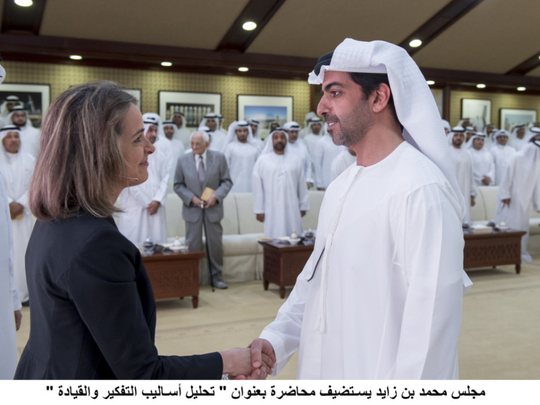
Abu Dhabi: Success in our ever more globalised and virtual world requires the skills to navigate through cultural differences and decode cultures foreign to our own, a renowned human resource expert said in Abu Dhabi Wednesday.
“Whether in Amsterdam or Abu Dhabi, Brasilia or Beijing, New York or New Delhi, we are part of a global network and unless we know how to decode other cultures and bridge cultural gaps, we are vulnerable to inefficiency,” Erin Meyer, Senior Affiliate Professor in the Organisational Behaviour Department at INSEAD here, told the majlis of His Highness Shaikh Mohammad Bin Zayed Al Nahyan, Abu Dhabi Crown Prince and Deputy Supreme Commander of the UAE Armed Forces.
Shaikh Hamed Bin Zayed Al Nahyan, Chairman of the Crown Prince Court and member of the Executive Council attended the majlis.
In the lecture titled: “The Culture Map: Decoding How People Think, Lead and Get Things done across the world”, Meyer suggested people can improve relationships by considering where they and their international partners fall on each of several scales. They include: Communicating — explicit vs. implicit; evaluating: direct negative feedback vs. indirect negative feedback; persuading: deductive vs. inductive; leading: egalitarian vs. hierarchical; and, trusting: task vs. relationship.
Meyer said cultures differ in terms of communication: in the Western Germanic cultures silence is uncomfortable in conversations where a silence of more than two seconds becomes awkward, while in Japan people can go silent in a conversation for up to 23 seconds without feeling awkward. She said in Germanic cultures, including the US, people tend to speak back and forth without interrupting each other, while the case is different in countries such as India or in the Arab world, especially in less formal contexts.
Meyer said Americans are the most explicit or low-context culture there is (low-context meaning their conversation assumes relatively little intuitive understanding). This is not surprising for a young country composed of immigrants that prides itself on straight-talking.
“Japan and other East Asian countries represent the other extreme. Thus, Americans in Japan should pay attention to what’s not being said; while Japanese in America should brace themselves for direct language,” she said.
The author of The Culture Map: Breaking Through the Invisible Boundaries of Global Business said: “The whole world is moving slowly towards low-context communication.”
“The only position that matters is the relative distance between the cultures. When you look at a country don’t think about the fixed positions, look at the relative position,” she said, stressing that good professional communication is a communication that is very simple, explicit and clear.
Meyer added that a high-context culture believes that communication is implicit and nuanced. The US is the lowest context culture in the world, while England is the lowest context in the Anglo-Saxon world.
Japanese culture is the highest context culture in the world where a good communicator can pick up the subtle messages in the air.
Low-context cultures tend to do things more in writing while high-context culture leave more for verbal interpretation.
When low-context people work with high-context people they say things like that they don’t trust them or are hiding information. Similarly, when high-context people work with low-context people they think of the person as being arrogant.
Meyer narrated a number of anecdotes that demonstrated that cultures have different ways of expressing themselves in terms of scheduling appointments, making decisions, etc.
Meyer is programme director for two INSEAD executive education programmes: Managing Global Virtual Teams and Management Skills for International Business. Her book, The Culture Map: Breaking Through the Invisible Boundaries of Global Business, received positive reviews by renowned publications, including the Financial Times and Foreign Affairs.
She won the Thinkers 50 “Radar Award” in November 2015, which is an award granted to one of the up and coming management thinkers most likely to impact the future thinking of business.
In 2016, HR magazine listed her as one of the top 30 HR influencers worldwide.












